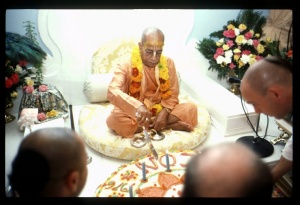CC Madhya 17.143 (1975)

A.C. Bhaktivedanta Swami Prabhupada
TEXT 143
- ataeva 'kṛṣṇa-nāma' nā āise tāra mukhe
- māyāvādi-gaṇa yāte mahā bahirmukhe
SYNONYMS
ataeva—therefore; kṛṣṇa-nāma—the holy name of Kṛṣṇa; nā—does not; āise—come; tāra mukhe—in their mouths; māyāvādi-gaṇa—all the Māyāvādīs; yāte—because; mahā bahiḥ-mukhe—great offenders by dint of strong atheism.
TRANSLATION
"Because the Māyāvādīs are great offenders and atheistic philosophers, the holy name of Kṛṣṇa does not come from their mouths.
PURPORT
Because they are constantly blaspheming the Supreme Personality of Godhead by saying that He has no head, hands or legs, Māyāvādī philosophers remain offenders for many, many births, even though they have partially realized Brahman. However, if such impersonalists are not offenders at the lotus feet of the Lord, they immediately become devotees in the association of a devotee. In other words, if an impersonalist is not an offender, he can become a devotee if he gets a chance to associate with other devotees. If he is an offender, he cannot be converted even by the association of the Supreme Personality of Godhead. Śrī Kṛṣṇa Caitanya Mahāprabhu was very much afraid of this Māyāvādī offender; therefore He spoke as follows.